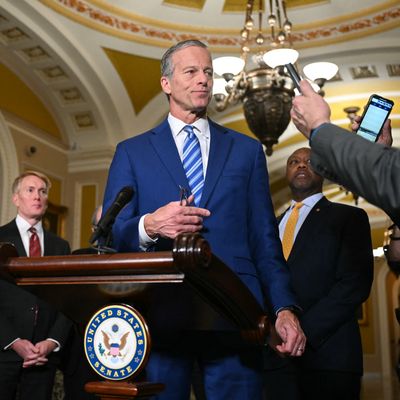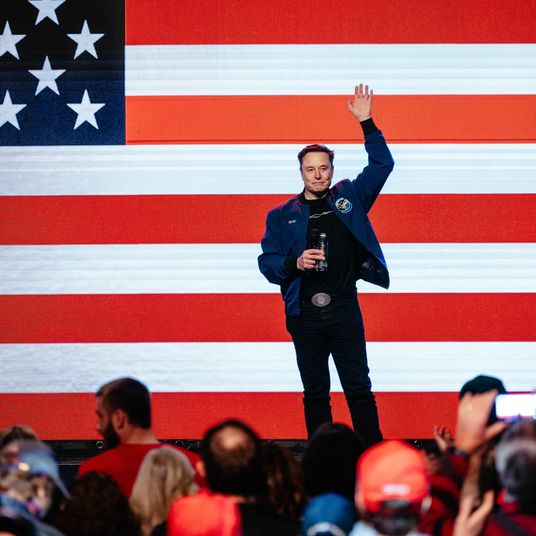
“Move fast and break things” is the unofficial slogan of Silicon Valley, and certainly the world’s wealthiest and most powerful tech bro, Elon Musk, has taken it to heart in attacking and destabilizing the federal government. Even his own operatives at DOGE can’t really keep up with the damage they are joyfully inflicting on the public sector, or what it might look like when they’re done.
But in the meantime, the government entity that really does have the lawful authority to do the things that DOGE has arrogated to itself as a reflection of Donald Trump’s imperial ideas of executive power, the U.S. Congress, is moving like molasses on the president’s legislative agenda. It’s not because Democrats are getting in the way: The minority party has been completely shut out of the decision-making process in Congress, and it may be giving up its last bit of leverage by accepting (not voting for, but also not filibustering) a Republican appropriations measure for the rest of this fiscal year as a lesser evil than a government shutdown.
The slo-mo pace in Congress is the product of three factors. First, Republicans decided ages ago that they would cram every bit of eligible legislation into a budget reconciliation bill that cannot be filibustered and that would pass both Houses on a party-line vote. That’s not surprising; Republicans did the same thing last time they had a “trifecta” in 2017, and so did Democrats when they had one in 2021. But the reconciliation process has its own set of arcane rules that make quick action very difficult.
Second, after weeks and weeks of vacillation, Trump told congressional Republicans he preferred a “one big, beautiful bill” strategy for reconciliation. This means that everything he wants, from increased spending on defense and border security, to an array of tax cuts, to offsetting domestic-spending reductions, will have to be loaded into one piece of legislation that somehow hangs together and complies with all the budget rules. Working that out between House and Senate Republicans, and ensuring the final product is something nearly all of them can support, is incredibly complicated and takes a lot of time.
Third, House and Senate Republicans are not working together well at all. After Trump endorsed the House budget resolution setting out a blueprint for a single reconciliation bill, the Senate became obligated to go along. But weeks after the House acted, the Senate hasn’t followed suit, apparently because it wants some changes that then the House will have to accept or reject. The whole process is becoming more complex and fraught with pitfalls precisely at the time when Republicans should be acting smoothly as a team. And as Politico reports, the deadlines for action keep getting pushed back:
But behind the scenes, House GOP leaders are stewing over what they see as the Senate’s failure to act expeditiously, despite House Republicans approving their budget plan two weeks ago.
In an effort to spur them along, Majority Leader Steve Scalise this week quietly encouraged GOP committee chairs to increase their public criticism of what he described as the Senate’s unacceptable timeline. Those House GOP leaders were also deeply alarmed when Sen. Thom Tillis of North Carolina, a Finance Committee member, emerged from a meeting of panel Republicans Monday night and said the reconciliation bill might not be completed until August.
There are some rather big problems with letting Trump’s entire legislative agenda slide until later in the year. For one thing, it’s entirely likely Trump’s popularity will fade as the inevitable backlash to what the executive branch is doing to federal agencies and programs builds. For another, one of Trump’s more popular ideas — one that’s absolutely Job One to major elements of his MAGA base — is the mass deportation of undocumented immigrants. But that really can’t happen on the level he’s promised without a significant shift of resources. That’s one major reason Republican senators wanted to do two reconciliation bills with the first devoted to beefing up the defense and border-security programs needed to get the deportation locomotive moving. But Trump said no to that, so now the deportation drive has stalled.
Perhaps the most alarming byproduct of endless delays in enacting a reconciliation bill is the possibility that it won’t happen in time to deal with a debt-default crisis, which is expected to arrive as early as June, when the Treasury runs out of ways to pay for U.S. obligations. Trump has demanded a $4 trillion debt-limit increase, and the idea was to include that in reconciliation so as to (a) deny Democrats leverage over it and (b) sugar-coat the measure for fiscal hawks who hate debt-limit increases. If the debt-limit measure slips out of reconciliation because that “one big beautiful bill” is stuck at some point in the legislative process when the bills come due, Republicans will have a real disaster on their hands.
So perhaps congressional Republicans can continue to vicariously enjoy the reckless pace at which Trump and Musk are moving to disrupt the “deep state,” even if that means abdicating centuries-long legislative-branch prerogatives over spending and federal-program authorizations. But Team Trump will need Congress to act decisively on the budget at some point down the road, and the institution is not off to a great start.
More on Politics
- Is Pete Hegseth About to Get Fired? Live Updates
- DOGE May Not Need Elon Musk Anymore
- Ivanka Wishes Us ‘Peace’ While Flaunting Costa Rica Trip






























